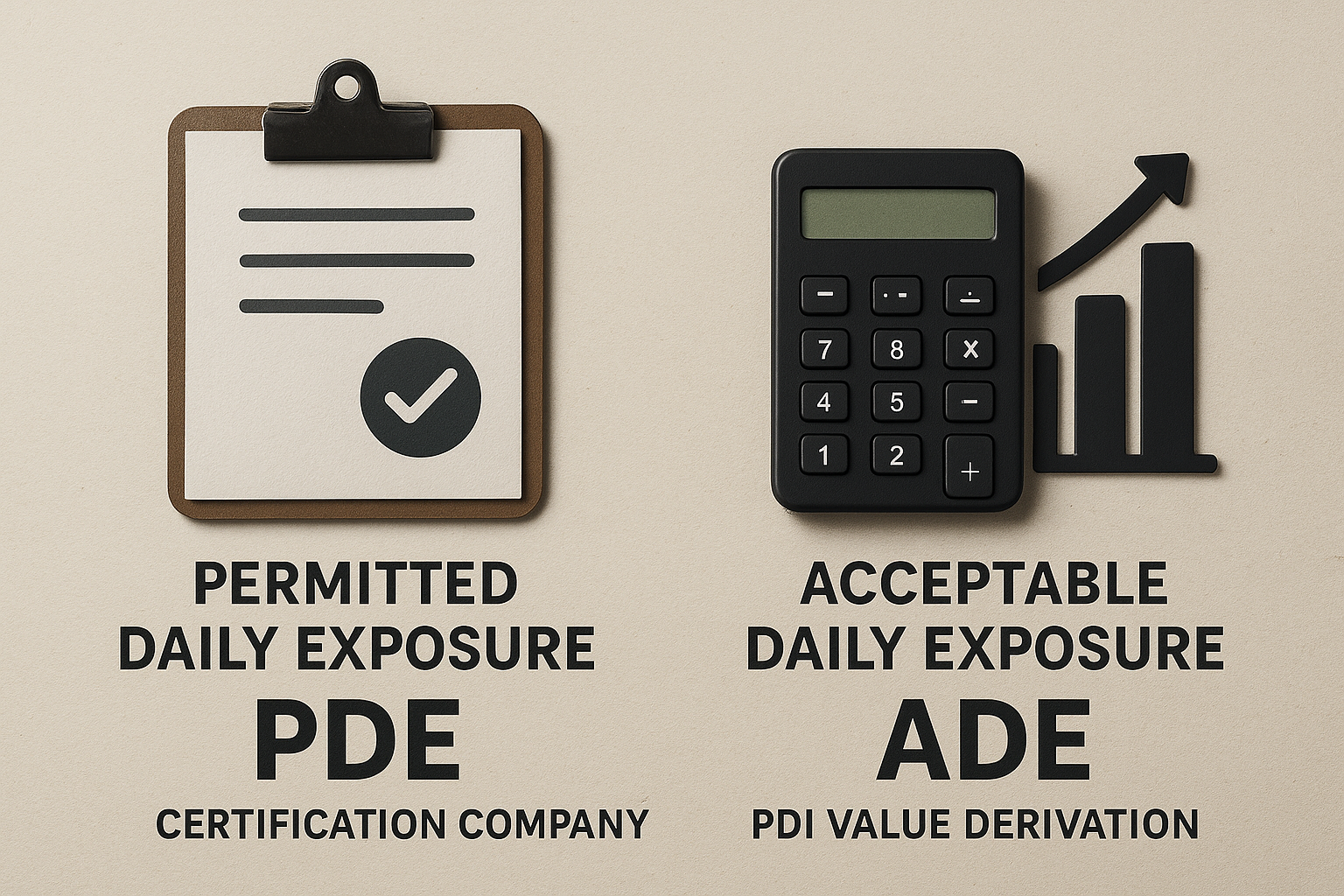
Permitted Daily Exposure (PDE) Certification Company & ADE (Acceptable daily exposure) PDI Value Derivation
November 2014 saw a release of guidelines with relevant impact on the manufacturer of multiple medicinal products in the shared facilities. It was PDE which is short of Permitted Daily Exposure. This PDE value of API is considered to be having prime importance after the very implementation of the European Medicine's Agency (EMA).
Understand ADE Certificate & PDE Certificate
A PDE certificate is a legal document that states the amount of a chemical that a person can be exposed to on a daily basis without any adverse health effects. This certificate is also sometimes called an "acceptable daily exposure" certificate (ADE Certificate).
The authority to issue PDE certificates is granted to regulatory agencies by the government. In the United States, the Environmental Protection Agency (EPA) is the primary regulatory agency responsible for issuing PDE certificates.
Other countries may have different agencies in charge of this responsibility. The PDE Certificate (Permitted Daily Exposure) is a document that states the maximum amount of a chemical that a person can be exposed to on a daily basis without any adverse health effects. The ADE Certificate (acceptable daily exposure) is similar to the PDE certificate, but it states the maximum amount of a chemical that a person can be exposed to on a daily basis without any adverse health effects over a lifetime.
What Is PDE? Why Is It Needed in The Context of Cleaning Validation?
PDE is known to be used to determine the acceptable amount of the previous drug that may be allowed in the step of the following drug as a carryover cross contaminant. This specific adequate level is called MACO (Maximum Allowable Carryover). This acceptable level, termed MACO, is then used for the ADE PDE calculation of the maximum safe surface residue or rinse concentration.
For What Purpose Is PDE Used on The Context of Cleaning Validation?
PDE is known to be used to determine the acceptable amount of the previous drug that may be allowed in the step of the following drug as a carryover cross contaminant. This specific adequate level is called MACO (Maximum Allowable Carryover). This acceptable level, termed MACO, is then used for the calculation of the maximum safe surface residue or rinse concentration.
How is PDE Value Derived?
ADE (Acceptable daily exposure) PDI Value derivation by ADE certification company requires critical examination and interpretation of toxicology, efficacy data, information on the route of administration, and other considerations. The possible potential risk of cross-contamination can certainly be restricted by PDE values through Acceptable daily exposure (ADE) PDI Value derivation. The entire ADE PDE Calculation involves steps such as:
- ADE Derivation (Acceptable Daily Exposures)
- The traditional method for calculating a health-based exposure limit (HBEL) is to utilize a formula that transforms a dose from animal toxicity research, usually the NOAEL, into a human dose.
- The human dose is then reduced to a level that can be considered safe using a number of correction parameters.
- HBELs should preferably be produced using human data rather than animal data where clinical data is available and deemed more relevant.
Hazard identification through structured literature search, identification of critical effects, establishment of NOEL, and application of adjustment factors, including bioavailability correction factors.
PDE determination is a relevant and highly integral part of toxicological risk assessment, which is entirely based on experimental and computational toxicology data. However, the tremendous experience in the conduct of laboratory experiments is not a definite must, but the very understanding of how various sorts of toxicological experiments are carried out along with other challenges one may find in interpreting the finding of multiple studies will obviously enhance the entire quality of data interpretation. So, in that case, a Permitted daily exposure certification from the best PDE certification company is an endorsement of a person's specific relevance of qualification and substantial expertise in the field of toxicology.
Our Expertise
Over the years, as a PDE (Permitted Daily Exposure) certification company and ADE Certification company, we have developed and delivered more than 1500 high-quality PDE reports in compliance with country-specific guidelines revolving around EMA, ISPE, ASTM, and others.
Our team of qualified toxicologists for ADE Certification established and structured literature search strategy, along with robust quality control checks right from document compilation to sign-off stages, are among some of the advantages that you get to experience with us. We house a qualified team of qualified toxicologists for ADE Certification and data scientists that work with the very gift of quick turnaround time.
Thus, for pharmaceutical manufacturing facilities derivation and establishment of Permitted Daily Intake (PDI) also known as Acceptable Daily Exposure (ADE) and Occupations Exposure Limits (OEL) have become an integral part of cleaning validation program to comply with various Regulatory or cGMP requirements. With a rich library of 1500+ certification-ready molecules, we are constantly expanding and updating as per global regulatory requirements.
It's time that you get in touch with our ADE certification company and get the benefit of our thorough scientific knowledge and experience in the identification of acute effects and other points of departure.
Aforesaid discusses the process of deriving an acceptable daily exposure (ADE) value for a PDE certification company. It also explains the importance of PDE certification and how it can benefit your business. If you have any questions or need more information, you can contact our Team of specialists, we would be happy to answer any of your questions.
